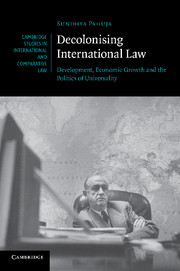Book contents
- Frontmatter
- Contents
- Acknowledgements
- 1 Introduction
- 2 Inaugurating a new rationality
- 3 From decolonisation to developmental nation state
- 4 From permanent sovereignty to investor protection
- 5 Development and the rule of (international) law
- 6 Conclusion
- Appendix One A note on the use of ‘Third World’
- Appendix Two Harry Truman – Inaugural Address
- Bibliography
- Index
- cambridge studies in international and comparative law
- References
2 - Inaugurating a new rationality
Published online by Cambridge University Press: 07 October 2011
- Frontmatter
- Contents
- Acknowledgements
- 1 Introduction
- 2 Inaugurating a new rationality
- 3 From decolonisation to developmental nation state
- 4 From permanent sovereignty to investor protection
- 5 Development and the rule of (international) law
- 6 Conclusion
- Appendix One A note on the use of ‘Third World’
- Appendix Two Harry Truman – Inaugural Address
- Bibliography
- Index
- cambridge studies in international and comparative law
- References
Summary
The new international institutions
The rationality I am tracing in this book is embedded in the institutional structure of contemporary international law. It operates through a dynamic relation between the formal institutions, the ideational sites of the academy and ‘practice’, broadly speaking, and the actions of both state actors and non-governmental organisations. These branches and sites are not disparate fragments of a kaleidoscopic field as may sometimes be understood, but rather operate as what we might think of nodes in the ‘ideological–institutional complex’ we know as international law. The rationality subordinates attempt to (re)define meanings for ostensibly universal categories by working through this complex and the dynamic relation between its parts. Key to those parts is the institutions understood respectively as the ‘political’ and ‘economic’ institutions of international law.
As we shall see, the dynamic relation operates together with law’s necessarily constitutive function to cast and recast certain issues or questions as properly belonging to one set of institutions rather than another – the ‘economic’ rather than the ‘political’, for example. The dynamic is given impetus and logical coherence by the concepts of development and economic growth that secure the institutional–ideological complex through the way they take up an exterior and superior, or what we might call ‘transcendent’, position in relation to international law.
- Type
- Chapter
- Information
- Decolonising International LawDevelopment, Economic Growth and the Politics of Universality, pp. 10 - 43Publisher: Cambridge University PressPrint publication year: 2011



